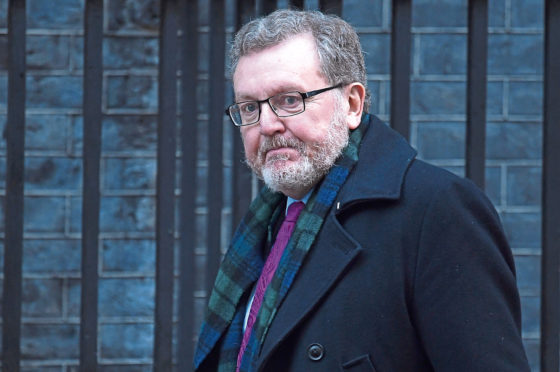Scottish Conservatives led by David Mundell have warned Theresa May they cannot support a Brexit deal that fails to restore “complete control and full sovereignty” over UK fishing waters.
The Scottish secretary, who previously threatened to resign if the withdrawal agreement introduces different arrangements for Northern Ireland, ambushed the prime minister as she unveiled the draft text to Cabinet yesterday.
His intervention came on the back of senior EU negotiator Sabine Weyand reportedly telling European ambassadors that Britain would “have to swallow a link between access to products and fisheries in future agreements”.
The leaked note, which she cast doubt on the authenticity of, also said the deal would mean the UK aligning its rules with Europe while the EU retains “all the controls”.
Bertie Armstrong, chief executive of the Scottish Fishermen’s Federation, immediately piled the pressure on the Tory leader, declaring anything less than the fulfilment of her commitments to the industry would make no deal a “more attractive option”.
In their letter, the 13 MPs – including the five representing north and north-east constituencies – pointed to Mrs May’s previous “welcome statements” that Brexit would mean leaving the Common Fisheries Policy (CFP) and negotiating as an independent coastal state from December 2020.
Anything less would be a “betrayal of Scotland”, they wrote, stressing access and quota shares “cannot be included in the future economic partnership, allowing the UK to become an independent coastal state both in principal and in practice”.
>> Keep up to date with the latest news with The P&J newsletter
And they repeated: “We also cannot remain in the CFP after December 2020.”
If the UK is not negotiating as an independent coastal state by this point, then it will be locked into CFP terms for another cycle, namely throughout 2021.
The letter added: “Our coastal communities have already made the difficult compromise of accepting extending CFP membership throughout the implementation period and they have made it clear to us that they will not accept any further extension.”
Mr Armstrong was clear there could be no link between access to UK waters for EU vessels and the trade of seafood products in the EU.
He added: “It contravenes all international norms and practice and is simply unacceptable in principle.
“The prime minister has made a series of commitments to the industry and anything less than the fulfilment of those means the sea of opportunity will not be realised and makes ‘no deal’ a more attractive option.
“We have been saying for two years that the only plausible way forward for the industry is for the UK to become an independent coastal state with the power to determine who catches what, where and when in our waters.
“It was this sovereignty that was so cruelly stripped from this country when we joined the EEC in 1973, betraying generations of fishermen and denying them the right to a fair living.”
Last month, Banff and Buchan MP David Duguid told the Press and Journal he had received reassurances from the prime minister that fishing negotiations would be kept separate from trade discussions in Brexit talks.
This was also the position set out in the UK Government’s Sustainable Fisheries for Future Generations white paper, released over the summer.
Outlining it in a piece for the P&J at the time, UK Cabinet Office Minister David Lidington insisted fisheries would be a “separate strand of our future relationship with the EU to the economic partnership”, with the former negotiated on an annual basis alongside other independent coastal states.
Earlier this month, Mr Mundell said the UK would not be bound by CFP rules beyond the end of 2020 “regardless of what else happens”.
The SFF seized on his remarks as confirmation fishing would be exempted in the event of any extension to the Brexit implementation period.
Thus far, the prime minister has stopped short of giving this guarantee, however, although she has said the interests of UK fishermen will be at the “forefront of our thinking”.
At Prime Minister’s Questions yesterday, Mrs May said: “We will become an independent coastal state and it will be the UK negotiating on the UK’s behalf in terms of access to UK waters.”
